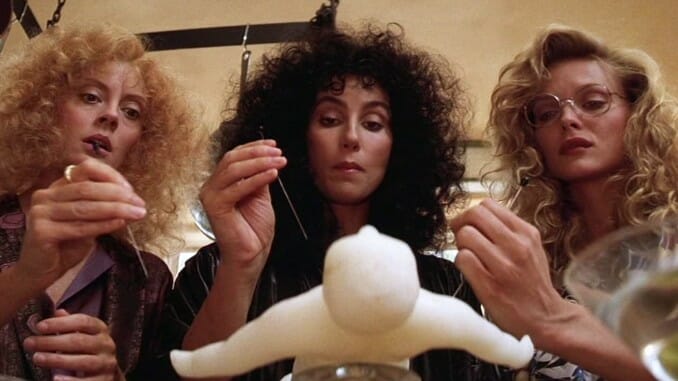Why You Should Watch the 1980s Feminist Comedy The Witches of Eastwick Right Now

“I don’t think men are the answer to everything,” says Alex, played by Cher, on the floor of her kitchen, flanked by Susan Sarandon and Michelle Pfeiffer sipping homemade cocktails.
“Then why do we always end up talking about them?” replies Susan Sarandon’s Jane.
In light of recent discourse on Twitter surrounding the “Bechdel Test” (a joke from Alison Bechdel’s comic Dykes to Watch Out For), this interaction during the first act of 1987’s The Witches of Eastwick feels particularly salient. Bechdel’s “test” was a rule one character in the comic created to decide whether they’d see a movie or not (it has to have two women in it who talk to each other about something besides a man).
Based on the 1984 novel by John Updike (whom you probably know from reading his short story “A&P” in, coincidentally, AP English in high school), the Witches of Eastwick film took a few departures from the source material and heightened its satirical tone for a brilliant blend of charisma, character, and Cher.
At its core, The Witches of Eastwick is a story about a trio of women embracing their feminine power and realizing both ends of religious dogma (heaven and hell) work to suppress women. The film opens with a quick montage of these three unsatisfied women, Alex (Cher), Jane (Sarandon), and Sukie (Pfeiffer), who lost their husbands through death, divorce, and desertion, respectively, and are navigating parenthood alone (save for Jane who’s unable to conceive, the reason her husband left her). Alex and Sukie pack the lunches, drop the kids off at school, and Jane is sexually harassed by a school official while giving the children music lessons.
Feeling trapped and stifled by the puritanical and patriarchal Rhode Island town of Eastwick, the three women find themselves wishing for a storm to put an end to a public official’s droning speech about a woman’s role in society: to serve men. Suddenly, the sky darkens, the clouds shift, and a torrent of rain starts to fall. The gathered mass disperses, and Alex, Jane, and Sukie reconvene at Alex’s house where Sukie determines they must have made the weather event happen by wishing for it simultaneously. Unbeknownst to them, the three women have formed a coven and their next collaborative wish is for a man—a man who couldn’t possibly exist.
Enter Jack Nicholson’s Daryl Van Horne, a self-described “horny little devil.”
-

-

-

-

-

-

-

-

-

-

-

-

-

-

-

-

-

-

-

-

-

-

-

-

-

-

-

-

-

-

-

-

-

-

-

-

-

-

-

-








































